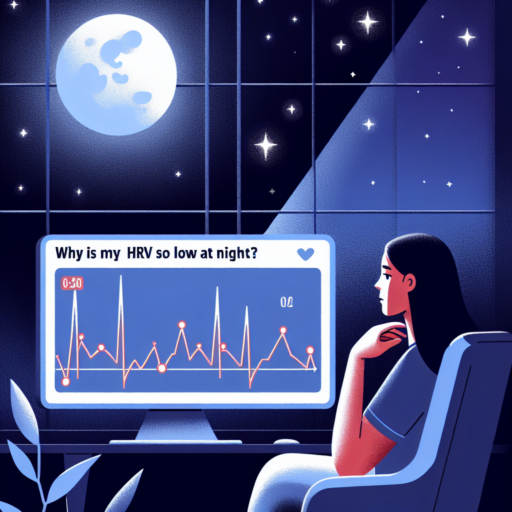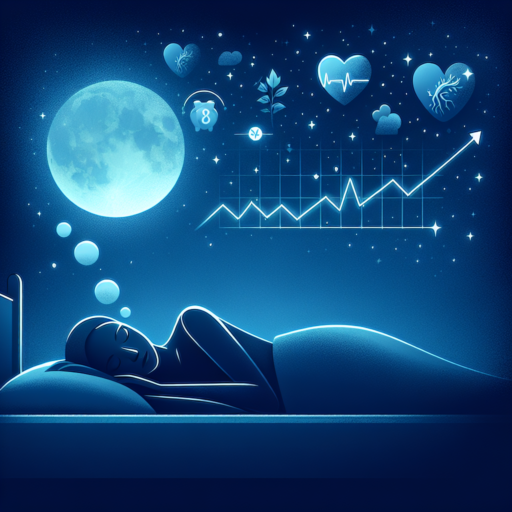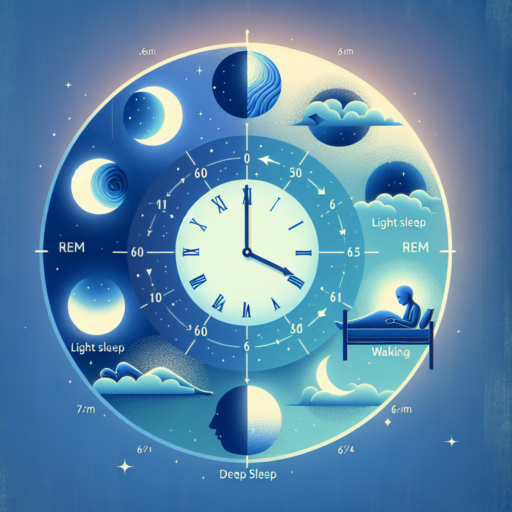No se han encontrado productos.
Why is my heart rate variability low at night?
Experiencing low heart rate variability (HRV) at night might seem counterintuitive, especially considering that HRV tends to increase during rest and decrease during stress or activity. A low HRV indicates a reduced ability of the heart to shift its rate in response to stress, potentially signaling less adaptability of the autonomic nervous system. Various factors can contribute to a decrease in HRV during the night, some of which include sleep quality, your daytime activities, and even your overall health condition.
Sleep quality plays a crucial role in determining HRV levels at night. Poor sleep, characterized by frequent awakenings or interruptions, can lead to a reduction in HRV. This is because sleep disturbances can stress the body, leading to an increase in sympathetic nervous system activity—the part of the autonomic nervous system responsible for the ‘fight or flight’ response. Consequently, this diminishes the body’s ability to maintain a high HRV, which reflects a more relaxed, restorative state controlled by the parasympathetic nervous system.
Daytime activities, including physical exertion and mental stress, significantly impact nighttime HRV. High levels of stress or excessive physical activity without adequate recovery can lead to sympathetic nervous system dominance, reducing HRV as the body remains in a heightened state of stress or recovery. Interestingly, implementing relaxation techniques or mild physical activities, such as yoga or meditation, during the day can help enhance nighttime HRV by promoting parasympathetic activity.
How do I raise my nighttime HRV?
Improving your nighttime Heart Rate Variability (HRV) can be significant for your overall health and well-being, as a higher HRV is often linked to better cardiovascular health, stress management, and recovery. Here are a few approaches to consider:
Establish a Consistent Sleep Routine
One of the most effective ways to improve your nighttime HRV is by establishing a consistent sleep routine. Going to bed and waking up at the same time every day, including weekends, helps regulate your body’s internal clock and improve your sleep quality. This, in turn, can positively affect your HRV by ensuring your body gets adequate rest and recovery time.
Engage in Regular Physical Activity
Regular physical exercise is another key factor in enhancing your nighttime HRV. Activities such as brisk walking, cycling, or swimming, when performed regularly, can significantly improve your cardiovascular health and increase your HRV. It’s important to balance exercise intensity and recovery, as too much high-intensity exercise without adequate recovery can actually lower your HRV.
Mindfulness and Stress Reduction Techniques
Incorporating mindfulness and stress reduction techniques into your daily routine can also have a profound impact on your nighttime HRV. Practices like meditation, deep breathing exercises, or yoga can help reduce stress and anxiety, which are often linked to lower HRV. By managing stress effectively, you can help improve your HRV and overall heart health.
Remember, making small, consistent changes to your lifestyle can have a significant impact on improving your nighttime HRV. Focus on developing habits that promote good sleep, physical health, and stress management for the best results.
What is a dangerously low HRV?
Heart Rate Variability (HRV) is a crucial measure of the variation in time between each heartbeat, reflecting the health and efficiency of the human body’s autonomic nervous system. An optimal HRV indicates a balanced body, ready to adapt and respond to stressors effectively. On the flip side, a dangerously low HRV can be an indicator of poor cardiovascular health, high stress levels, or underlying systemic challenges that may require medical attention.
Identifying what constitutes a dangerously low HRV can depend on several factors, including age, fitness level, and individual health conditions. However, consistently low readings, significantly below an individual’s baseline, could signal an inability of the heart to adequately respond to different stress levels. This state of reduced variability can be particularly concerning as it is often associated with an increased risk of cardiovascular disease, sudden cardiac events, and can even be a predictor of chronic stress issues.
Another aspect to consider is the impact of lifestyle on HRV. Poor sleep quality, lack of exercise, unhealthy diet, and persistent stress are known to decrease HRV. Monitoring and adjustments in these areas are essential steps in preventing the slide into dangerously low HRV levels. For those tracking their HRV through wearable technology or medical assessments, observing significant and sudden drops in HRV should prompt further investigation, preferably in consultation with healthcare professionals.
What is a good overnight HRV score?
Understanding your overnight Heart Rate Variability (HRV) score is pivotal in assessing your autonomic nervous system’s efficiency, which plays a significant role in your overall health and recovery status. Generally, a good overnight HRV score varies significantly among individuals, taking into account personal health status, age, and fitness level. However, higher HRV scores typically indicate better cardiovascular fitness, stress resilience, and recovery status.
Factors Influencing Overnight HRV
A myriad of factors can influence your overnight HRV score. These include physical activity levels during the day, stress, sleep quality, and even dietary habits. It’s important to consistently monitor your HRV trends over time rather than fixating on single, isolated readings. Noticing patterns in how your behaviors and lifestyle choices affect your scores can be incredibly insightful for personal health optimization.
Achieving Optimal HRV Scores
To boost your overnight HRV score, consider improving sleep habits, managing stress through mindfulness or meditation, and maintaining a regular exercise regimen. Consistency in these areas can significantly improve your HRV readings over time, reflecting enhanced autonomic nervous system function and, by extension, better health and recovery capabilities.




